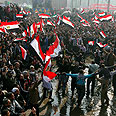It seems clear that after a year of political unrest, sectarian violence, civil strikes, and economic turmoil, the majority of Egyptians have opted to ensure their security, even if it means forgoing the original goals of the revolution. This security has been achieved by the emergence of a new balance of power, carefully negotiated against the backdrop of parliamentary elections between the Muslim Brotherhood and the ruling military council.
This shadowy agreement first became evident in November 2011, when liberal activists rioted in downtown Cairo, threatening stability before the onset of parliamentary elections. While the media flocked to Mohammed Mahmoud Street to capture romantic images of stone-throwing youth, Muslim Brotherhood leaders secretly met with military council officials to find a way to end the violence in a mutually beneficial manner.
It was during these behind-the-scenes meetings that the two parties allegedly reconciled their previous differences on the nature of Egypt’s constitution, agreeing in turn to each do their part to ensure stability in the country.
As a result, the Muslim Brotherhood agreed to support the military council's timetable for transfer of power, pledging to refrain from contributing to any protest movement which may arise. Meanwhile, military officials agreed to allow a Brotherhood-dominated parliament to decipher the constitution while reportedly ensuring a presidential system that would guarantee the military’s continued influence in government.
As reports of the agreement began to stream in through local media, the Muslim Brotherhood staunchly denied its participation. However, its actions since November provide a telling indicator that Egypt’s most influential faction is now in cahoots with the increasingly unpopular military council.
When riots flared again in December 2011, the Brotherhood came out in support of the military council's timetable for presidential elections, going against calls made by liberal politicians. Just as Egypt appeared divided over the celebratory nature of the revolution’s anniversary, the Muslim Brotherhood openly held supportive rallies in Tahrir Square opposite thousands of secular and liberal activists who were calling for the military rulers' removal from power.
Security trumps democracy
Given the media’s fascination with Egypt’s seemingly continuous revolution, one would think that the Muslim Brotherhood’s support of the much-hated military council would detract from its popularity. The Brotherhood’s subsequent success in parliamentary elections and ever-growing popularity proves that Egyptian reality is incommensurate with the media’s portrayal.
In reality, the Brotherhood’s agreement with the military council did not draw the ire of the average Egyptian for the simple fact that much of the population only seeks the restoration of security. The instability and uncertainty in the wake of Mubarak’s ousting has not only put many Egyptians out of work, but has also caused many residents to fear for their personal safety in a growing security vacuum.
Hence, the outrage of the educated liberal elite over issues like imprisoned bloggers has continuously failed to resonate with a population that finds itself struggling to survive. In the eyes of Egyptians, the destabilizing violence caused by these groups’ pursuit of liberal-democratic governance has only contributed to their hardship, effectively becoming more of a nuisance than a legitimate struggle.
The Brotherhood, like the average Egyptian, still views the military as the only entity capable of keeping the country afloat. For a group that desperately needed such security for its rise to power during the lengthy polling period, an agreement to cooperate with the military council was clearly a well calculated move.
As Egypt moves into the second year since its rebirth, liberal activist groups are likely to continue drawing media attention through colorful demonstrations in Tahrir Square. Yet outside of Cairo, the average Egyptian has reconciled himself to the idea that ensuring personal security under a military-influenced government is preferable to the prolonged instability that comes from pursuit of liberal democracy.
Since Mubarak’s ousting, the liberal activists who first took to the streets to spark the uprising have consistently claimed that the revolution has been stolen from under their noses. Embodying that sentiment is their protest on January 27, which was dubbed “Friday of Anger.” Their anger however, need not lie with the military government or the Muslim Brotherhood. As with any undemocratic regime, the military council continues to rule not in spite of the Egyptian people, but with their compliance.
The author works for Max Security Solutions , a geo-political risk consulting company based in the Middle East.
















